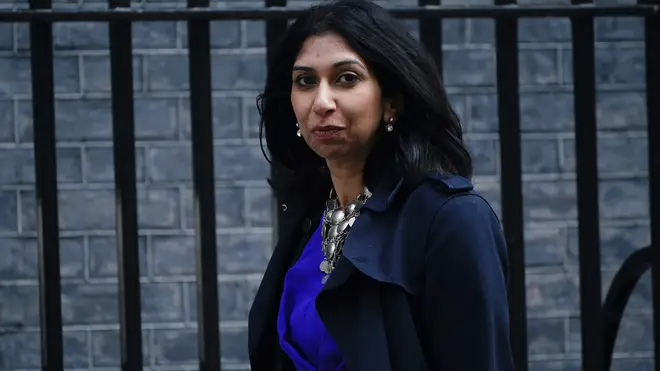
Paul Brand 7am - 10am
19 May 2022, 00:04

Suella Braverman will use a speech at the Chatham House think tank to lay out the Government’s position on the issue.
International law should be applied to cyberspace to make it clear when a nation state has acted unlawfully and what action can be legally taken in response to a cyberattack, the Attorney General will say.
Suella Braverman will speak on Thursday at the Chatham House foreign affairs think tank to set out the UK’s position on cybersecurity and international law and how it can help inform decisions on what constitutes unlawful action.
Ms Braverman is expected to use the speech to highlight how a united international approach to the issue would help establish and shape such a framework, highlighting the global response to Russia’s invasion of Ukraine as an example.
“The ongoing conflict in Ukraine has demonstrated, on the part of Russia, a callous disregard for established international rules,” she will say.
“However, the unprecedented and united international response in support of Ukraine has also reinforced the value of having a framework that makes clear when state action is unlawful.
“Commentators often talk in hushed tones of cyber weapons, with little understanding of what they are, or of the rules which govern how they are used.
“This misunderstanding means we can see every cyber incident as an act of warfare which threatens to bring down the modern world around us and it’s not uncommon for even seasoned observers to think in this way, as they speak of cyber as a new battlespace where no rules apply.
“But cyberspace is not a lawless ‘grey zone’. International law governs and plays a fundamental role in regulating cyberspace.”
The Attorney General will highlight the need for “leadership and partnerships” between the UK and its partners to shape and strengthen international cyber governance, with the aim of promoting a “free, open, peaceful and secure cyberspace”.
Ms Braverman is expected to say the Government’s position is that the international principle of non-intervention – that every state has the right to sovereignty and territorial and political independence – should also be the approach in cyberspace, and that breaching these rules would give nations the right to retaliate.
Her stance builds on one first made by the Government in 2018.
“The UK’s position is that the rule on non-intervention provides a clearly established basis in international law for assessing the legality of state conduct in cyberspace during peacetime,” she will say.
“It serves as a benchmark by which to assess lawfulness, to hold those responsible to account, and to calibrate responses.
“It is therefore important to bring the non-intervention rule to life in the cyber context, through examples of what kinds of cyber behaviours could be unlawful in peacetime.
“To move the focus to the types of coercive and disruptive behaviours that responsible states should be clear are unlawful when it comes to the conduct of international affairs in peacetime.
“And being clear on what is unlawful means we can then be clearer on the range of potential options that can lawfully be taken in response.
“That is, the kinds of activities which would require legal justification, for example, as a proportionate response to prior illegality by another state.
“This is crucial in enabling states to act within the law whilst taking robust and decisive action.”
The approach will encourage “more agile and decisive international action in response to specific threats” and will help “avoid inadvertent or damaging escalations”, Ms Braverman will say.